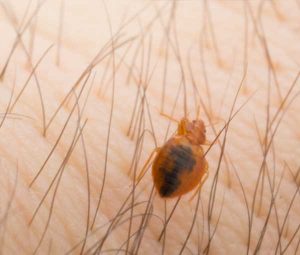Bed Bug Bites
Bed bugs’ bites are often one of the first signs of an infestation. These tiny pests feed on human blood, usually while you’re sleeping. Bed bugs are most active during the night, particularly in the early morning hours just before dawn. Their bites often appear as small, red, itchy welts, typically grouped in a line or cluster.
This page provides essential information about bed bug bites, including how to recognize them, when and why bed bugs are most likely to strike, and tips for managing the discomfort.

Basic Bed Bug Bite Information
- Bed bugs will bite anyone – all they want is a warm-blooded host – but some people are more at risk than others. See our separate article on who is at risk of bed bug bites for details.
- Bites will appear on areas of the body that are exposed at night, such as the arms and legs.
- Bites are commonly arranged in lines or zigzag patterns.
- Everyone reacts to bites differently. Some people have no symptoms while others can get welts and more serious rashes.
Say Goodbye to Pest Problems for Good!
Fill out the form below and we’ll be in touch!
*During normal business hours. After hours inquiries will be returned the next business day.
When Do Bed Bugs Bite?
Bed bugs are most active at night, typically biting between midnight and dawn. This behavior aligns with their natural instinct to feed when their hosts are least active and most vulnerable—while sleeping. During these quiet hours, bed bugs can move unnoticed, seeking exposed areas of skin to feed on. Their bites are often painless initially, allowing them to go undetected until itchy red welts appear later.
This nocturnal feeding pattern is not random; it’s a survival strategy. By biting when humans are asleep, bed bugs minimize the risk of being disturbed, ensuring they can complete their meal undisturbed.
Where Do Bed Bugs Bite?
Bed bugs can bite anywhere on the body, but they often target exposed skin areas, such as the arms, legs, neck, face, and hands. These pests are drawn to parts of the body that are uncovered during sleep, making these areas prime locations for feeding. Their bites usually appear as small, itchy, red bumps and are often grouped together in a line or cluster—a telltale sign of bed bugs at work.
While their bites may resemble other insect bites or skin conditions, the pattern and placement can help differentiate them. If you notice clusters of red bumps on exposed skin and other signs of bed bugs, such as dark stains on bedding or mattresses or a musty odor in your sleeping area, it’s essential to investigate further.
While bites on the face may occur, you don’t need to worry about bed bugs crawling in your nose, mouth, or ears, which is a common (and understandable) concern. These bugs feed on the surface of your body and prefer to retreat after their meals.
Are Bed Bug Bites Dangerous?
While bed bug bites are not known to directly transmit diseases, they can still cause discomfort and health concerns. For most people, the main symptom is persistent itching, which can lead to irritation or even a secondary skin infection if scratched excessively. Some individuals may experience a stronger allergic reaction to the bites, causing significant swelling, redness, and discomfort. In severe cases, these reactions might require medical attention and the use of antihistamines or anti-itch creams to alleviate symptoms.
Although there are no confirmed diseases associated with bed bugs, the itching and scratching caused by their bites can compromise the skin’s protective barrier, increasing the risk of skin infections. Furthermore, the emotional toll of a bed bug infestation—such as stress, anxiety, and sleep disturbances—can indirectly impact overall well-being. If you suspect an allergic reaction or notice symptoms like swelling or signs of infection, it’s important to consult a healthcare provider for proper treatment. Proactively managing bed bug bites and addressing infestations promptly is key to minimizing these health risks.
FAQs About Bed Bug Bites
Can you feel bed bugs when they bite?
No, you typically cannot feel bed bugs when they bite. Their saliva contains an anesthetic that numbs the area, allowing them to feed without being noticed. The first symptom of a bite is usually itchy, red bumps or welts that appear later.
What happens if bed bugs bite you?
When bed bugs bite, they inject saliva that can cause red, itchy welts. Some people may develop an allergic reaction, leading to swelling, blisters, or severe itching. Scratching the bites can increase the risk of a skin infection. To reduce itching and discomfort, you can use anti-itch creams or antihistamines.
What bites can be mistaken for bed bug bites?
Bites from mosquitoes, fleas, spiders, and other insects can be mistaken for bed bug bites. Skin conditions like hives or allergic reactions can also cause red bumps or welts similar to bed bug bites. Observing the bite’s pattern and checking for bed bug signs can help confirm the cause.
How do you tell if bites are from bed bugs?
To identify bed bug bites, look for red bumps in a linear or clustered pattern on exposed skin. Additionally, inspect your sleeping area for bed bug signs such as dark fecal spots, shed skins, or the insects themselves hiding in crevices, mattress seams, or furniture.
What is biting me in my sleep but not bed bugs?
Other pests like fleas, mites, or mosquitoes may bite at night. Skin irritation could also be caused by an allergic reaction to fabrics or chemicals. Inspect your sleeping area thoroughly to rule out bed bugs and other potential sources of irritation.
Why do I keep getting bitten but not my partner?
Bed bugs may prefer one person over another due to body heat, carbon dioxide levels, or skin chemistry. Additionally, some individuals have stronger reactions to bites, while others may not develop noticeable symptoms like itching or red bumps.[/vc_column_text]
[/vc_column][/mk_page_section]
